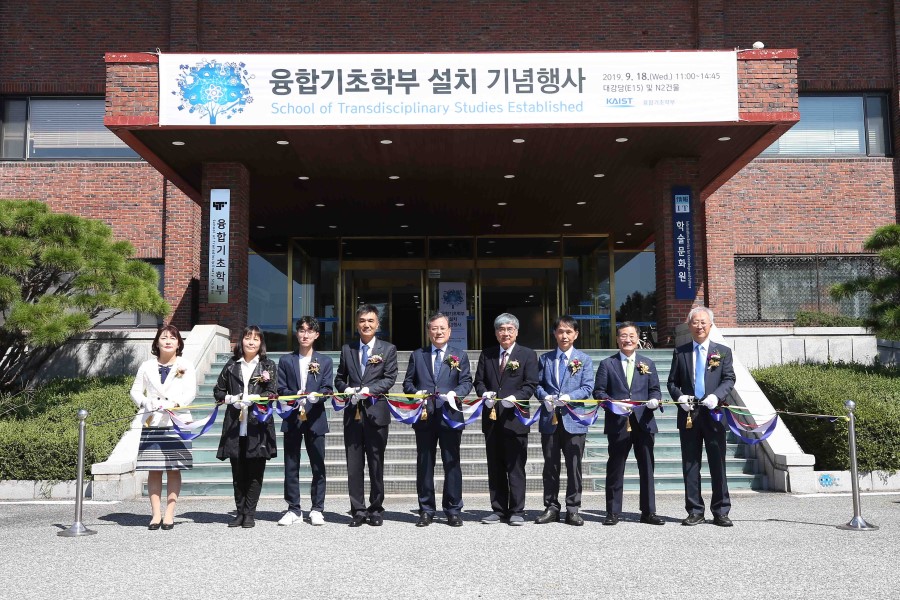policy

KAIST opened the School of Transdisciplinary Studies to foster ‘convergent talents’ who can create new knowledge through a transdisciplinary approach. The new department will officially start classes in the spring semester of 2020 while recruiting its first cohorts during the fall semester among current freshmen.
President Sung-Chul Shin, the Head of the School of Transdisciplinary Studies Jong Duk Kim, and other prominent members of KAIST’s administration celebrated the opening of the new department during a ceremony on September 18. Students who will declare their major this semester and many parents showed strong interests in this new department while attending the ceremony. They all toured the new facilities together and attended the special lecture sessions.
The School of Transdisciplinary Studies is designed to empower students to create new solutions to emerging complex technologies and rapidly evolving global issues. This is one of the education innovation initiatives under Vision 2031, the plan President Sung-Chul Shin has launched to nurture creative young convergent leaders, and the first single transdisciplinary department that will be introduced in a Korean university.
The new faculty aims to educate students who will have a deeper understanding of the humanities, scientific creativity, the ability to conceive new ideas, complex problem-solving skills, and global leadership. The curriculum boasts a strong foundation of basic science and humanities over six required courses in physics, chemistry, molecular biology, applied mathematics modeling, data structure, and economics. Then, students will explore their academic depth by choosing one of eight emerging fields. The eight concentration majors encompass data and AI, smart cities and media, healthcare, culture and media, management and startups, materials and matter, energy and environment, and machinery and precision. In their third and fourth years, students can customize their study course based on their career path and academic interest after consultation with a faculty mentor and an internship. Upon graduation, they will earn a bachelor’s degree in convergent science or a bachelor of convergent engineering degree. They may also elect to receive a bachelor’s degree in science or engineering.
“This faculty offers deep knowledge in basic science and humanities to help students explore their specialties more creatively. Specialties built upon strong theory and creative applicability will be the key to solving the global challenges in an era of volatility, uncertainty, complexity, and ambiguity,” said Professor Kim, the head of the school, at the ceremony.
President Shin also stressed the importance of convergence education during his special lecture, saying, “We will continue to strive to foster new talents who will create new convergent knowledge in emerging technologies such as IoT, big data, 5G, and AI. By fostering such young convergent talents, we will take the lead in national development and work for the prosperity of humanity.”
(END)
-
research Phage resistant Escherichia coli strains developed to reduce fermentation failure
A genome engineering-based systematic strategy for developing phage resistant Escherichia coli strains has been successfully developed through the collaborative efforts of a team led by Professor Sang Yup Lee, Professor Shi Chen, and Professor Lianrong Wang. This study by Xuan Zou et al. was published in Nature Communications in August 2022 and featured in Nature Communications Editors’ Highlights. The collaboration by the School of Pharmaceutical Sciences at Wuhan University, the First Af
2022-08-23 -
policy KAIST to join Deep Space Exploration Project
KAIST agreed to launch the Deep Space Exploration Research Consortium with two key leading aerospace research institutes, the Korea Aerospace Research Institute (KARI) and the Korea Astronomy and Space Science Institute (KASI) during a recent meeting at the KAIST campus. President Kwang Hyung Lee, KARI President Sang-Yool Lee, KASI President Young-Deuk Park, and Vice Minister of Science and ICT Hong-taek Yong attended the meeting to discuss medium- and long-term deep space exploration plans an
2021-06-07 -
people Professor Lee Elected as a Council Member of ION
< Professor Jiyun Lee > Professor Jiyun Lee from the Department of Aerospace Engineering became the first professor of Korean university to be selected as a council member of the Institute of Navigation (ION), serving specifically as a technical representative. ION is a world-leading organization established in 1945 and dedicated to advancing Positioning, Navigation and Timing (PNT) technologies. ION’s international membership is drawn not only from professionals in the
2019-06-27 -
people 'Think Out of the Box,' Team Circos Wins the P4G Innovation Sprint
<The winning team of the P4G Innovation Sprint poses with the Crown Prince of Denmark (sixth from the left in the first row) and President Shin (fifth from the left in the first row) during the awarding ceremony.> Team Circos from KAIST and Denmark made a new sustainable business model for Hempel, a global coating supplier group in Denmark, and won the first prize at the P4G (the Partnership for Green Growth and Global Goals) Innovation Sprint held at KAIST’s Seoul campus on M
2019-05-23 -
people First Korean Member of OceanObs' Organizing Committee
Professor Sung Yong Kim from the Department of Mechanical Engineering became the first Korean to be elected as an organizing committee member of the international conference OceanObs’19’, specializing in the ocean observing field. Professor Kim has been actively engaged in advisory panels, technical committees, and working groups for the North Pacific Marine Science Organization (PICES). Through numerous activities, he was recognized for his professionalism and academic achievemen
2019-01-25